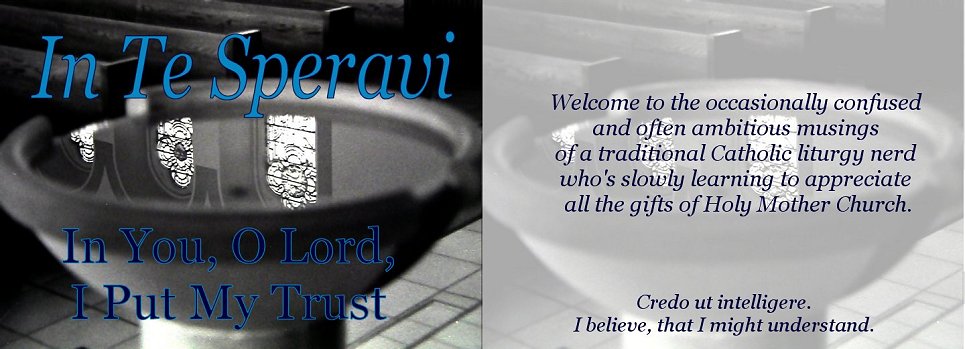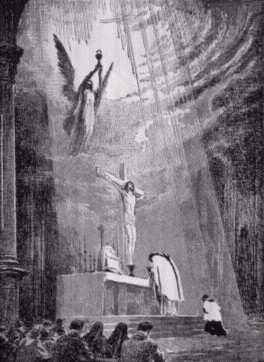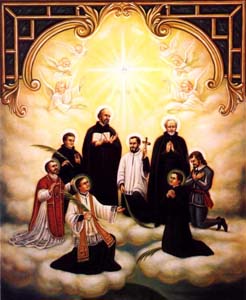Many of you have probably observed that
priests don't usually call each other “Father,” but rather simply
by their first names – as seems perfectly appropriate to their
brotherhood. What is less easy to observe is that this same practice
has become commonplace among laity, in settings where the ratio of
priests to laypeople is fairly high.
So these last two years of living at a seminary among priest classmates, and now my brief time working at a chancery, have shown me that I am in the vast minority, to piously insist on calling priests “Father.”
Thus, with no judgment implied on those whose practice is otherwise, I humbly undertake to explain to a generic priest just why it is that his title is so much more important, in practice, than Doctor or Judge or even Mister.
Why do I call you Father?
It's not out of respect, though I do respect you. You have sacrificed much to serve others, to serve me, and I do appreciate it, but that is not why I call you Father.
It's not in deference to your education. To be frank: In most cases, I am equally educated, or at least darn close. I have equal facility in general philosophical and theological fields and more knowledge in specialized liturgical ones. When you do know more, I have for you the respect of a scholar, not of a priest.
It's not because you're better than I am, or of a higher spiritual class. True, your vocation is supernatural to my natural one, but we are both children of God, merely different parts of the body. No, it is not out of self-debasement that I call you Father.
It's not because I think a friendship or working relationship between us would be impossible or inappropriate. I work with priests nearly every day. Too, I know so many priests who are yet dear friends. Just because he calls me by name and I call him Father does not bespeak an inequality that prevents communication or authenticity.
It's not because you've been a priest the entire time I've known you. Of course, sometimes this is the case, but so many of you I have been privileged to know during your seminary days or even before, and I am only the more careful to call you Father.
It's not because you're holy, although certainly you ought to be. But you're subject to at least as much temptation as the rest of us. When I learn of (or observe) your sins, it does hurt more than do the sins of others. But even if you were to be caught in public scandal, I would still call you Father.
No. The reason I call you Father is much greater than all that.
I call you Father because Our Lord Jesus Christ has configured your soul to His own, has transformed you into Himself in a particular way. You remain the man you've always been, and yet become Jesus Christ in the flesh. His presence may be hidden in you, just as His divinity was hidden on the Cross, but appearances matter differently in this world of sacraments and symbols.
I call you Father to remind myself of Jesus' great gifts to us, continually poured out in the sacraments. I call you Father to thank you for humbling yourself and putting on the person of Christ. I call you Father because it is your very identity to be Christ embodied in the 21st century.
So the next time I call you Father, recognize that it's not merely a polite greeting. It's a thank you for your vocation; it's an encouragement to be holy as He is holy; it's a recognition that your presence manifests His glory.
Thank you, Father.
So these last two years of living at a seminary among priest classmates, and now my brief time working at a chancery, have shown me that I am in the vast minority, to piously insist on calling priests “Father.”
Thus, with no judgment implied on those whose practice is otherwise, I humbly undertake to explain to a generic priest just why it is that his title is so much more important, in practice, than Doctor or Judge or even Mister.
Why do I call you Father?
It's not out of respect, though I do respect you. You have sacrificed much to serve others, to serve me, and I do appreciate it, but that is not why I call you Father.
It's not in deference to your education. To be frank: In most cases, I am equally educated, or at least darn close. I have equal facility in general philosophical and theological fields and more knowledge in specialized liturgical ones. When you do know more, I have for you the respect of a scholar, not of a priest.
It's not because you're better than I am, or of a higher spiritual class. True, your vocation is supernatural to my natural one, but we are both children of God, merely different parts of the body. No, it is not out of self-debasement that I call you Father.
It's not because I think a friendship or working relationship between us would be impossible or inappropriate. I work with priests nearly every day. Too, I know so many priests who are yet dear friends. Just because he calls me by name and I call him Father does not bespeak an inequality that prevents communication or authenticity.
It's not because you've been a priest the entire time I've known you. Of course, sometimes this is the case, but so many of you I have been privileged to know during your seminary days or even before, and I am only the more careful to call you Father.
It's not because you're holy, although certainly you ought to be. But you're subject to at least as much temptation as the rest of us. When I learn of (or observe) your sins, it does hurt more than do the sins of others. But even if you were to be caught in public scandal, I would still call you Father.
No. The reason I call you Father is much greater than all that.
I call you Father because Our Lord Jesus Christ has configured your soul to His own, has transformed you into Himself in a particular way. You remain the man you've always been, and yet become Jesus Christ in the flesh. His presence may be hidden in you, just as His divinity was hidden on the Cross, but appearances matter differently in this world of sacraments and symbols.
I call you Father to remind myself of Jesus' great gifts to us, continually poured out in the sacraments. I call you Father to thank you for humbling yourself and putting on the person of Christ. I call you Father because it is your very identity to be Christ embodied in the 21st century.
So the next time I call you Father, recognize that it's not merely a polite greeting. It's a thank you for your vocation; it's an encouragement to be holy as He is holy; it's a recognition that your presence manifests His glory.
Thank you, Father.
That You would deign to maintain the whole priestly order in holy religion, We beseech You, hear us.
That You would deign to provide Your people with pastors after Your own heart, We beseech You, hear us.
That You would deign to fill them with the spirit of Your priesthood, We beseech You, hear us.











